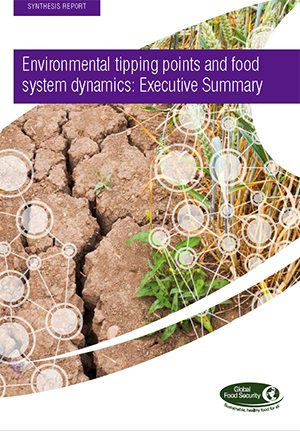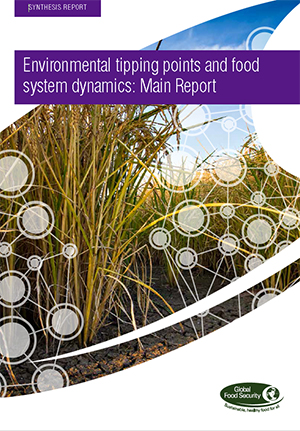The Global Food Security (GFS) programme has published a new report providing evidence for the existence of environmental tipping points and exploring the potential consequences for global food security.
The report ‘Environmental tipping points and food system dynamics’ was unveiled at a Parliamentary event held Wednesday 11 January attended by MPs, policy-makers, leading industry figures, researchers and funding agencies.
Environmental tipping points occur when a biophysical system experiences a shift from one stable state to another, thereby altering its function. These ‘step-changes’ deviate from the linear way we might usually expect a system to behave, and pose a serious threat to global food security because they could bring about profound changes in the provision of environmental goods and services that are difficult to reverse, which in turn could have serious effects on global food production.
Key findings from the report include:
- The need to give greater consideration to potential step-changes in food systems as part of risk management
- The need for more research into environmental tipping points and their potential impact on food system dynamics, the interaction between environmental tipping points and socio-economic systems, and ways to improve forecasting
- How to act on information if there is a real risk that a tipping point is being reached. The report also provides a novel framework (‘ETTA’ – Existence, Threat, Trajectory, Alternatives) to support risk management
- Costs and benefits of action now to prevent crossing a tipping point, versus reaching the tipping point and having to adapt
- Two major case studies for plausible environmental tipping points – including the potential for a dustbowl in East Anglia – with analysis of how we might respond to these scenarios.

The Parliamentary event included speeches from: Lord Cameron of Dillington, Chairman of the GFS Strategy Advisory Board; and former GFS Champion Professor Tim Benton, University of Leeds, who chaired the inter-disciplinary and inter-sectoral working group of academics and industry experts behind the report.

Tim Benton said: “Most people think we live in a ‘linear world’ where small changes have small effects and can be reversed. This report highlights that this may be far from the case: sometimes small changes can have big effects. Climate change may not be about gradual adaptation to a globally changing climate: it might ‘tip’ suddenly into a new and very different state, for example, incremental degradation of soils leading to large scale soil loss under certain conditions, as happened in the Midwest Dust Bowl.
“Such step changes in the way the world works could have big impacts for the way we produce food. This report emphasises that building resilient agri-food systems is not just about buffering against familiar “shocks” – such as extreme weather – but also thinking about the unfamiliar, but potentially important, role of sudden non-linear changes in the way the food system works.”
Riaz Bhunnoo, Head of the GFS programme said: “One of the biggest risks to the food system is climatic shocks, and this work on tipping points follows our recent impactful work on extreme weather. The report includes thought-provoking case studies, such as the possibility of a dust-bowl in East Anglia, and asks ‘what would we do if this happened?’ This project is a good example of our key role in thought leadership and bringing different stakeholders together to develop a common framing of emerging issues, whilst also shaping the future research agenda.”
The reports are available below:

Environmental tipping points and food system dynamics: Executive Summary
Environmental tipping points occur when a biophysical system shifts from one stable state to another, potentially bringing about changes in the provision of environmental goods and services. This report provides a summary of outcomes and recommendations from an inter-disciplinary and inter-sectoral working group considering potential impacts of tipping points within the food system.
(You can view PDF documents by downloading a PDF reader. We recommend using Google Chrome or Mozilla Firefox web browsers.)

Environmental tipping points and food system dynamics: Main Report
This report details outcomes and recommendations from an inter-disciplinary and inter-sectoral working group considering tipping points in the food system. Their work provides evidence for the existence of environmental tipping point as well as an exploration of their potential consequences for global food security and options for risk mitigation.
(You can view PDF documents by downloading a PDF reader. We recommend using Google Chrome or Mozilla Firefox web browsers.)
ENDS


